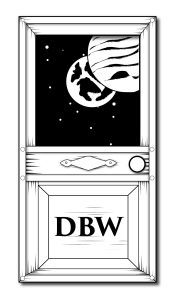There is no such thing as bad writing.
There is no such thing as bad writing.
I’ve decided this is my mantra for the New Year. And I hope you will join in with me.
I can hear what you’re thinking…what about that paragraph I wrote with all those horrible mistakes? Or the slogan I read the other day with the misplaced apostrophe? Or that sentence that violates everything my elementary school English teacher held dear? I want to pull out my hair, it’s so terrible!
It’s time to channel Obi-Wan Kenobi. Look at yourself in the mirror, wave your hand in the air, and tell your inner critic:
There is no such thing as bad writing. This just isn’t the writing you’re looking for.
Encountering the Empire
I went through school at a time when learning grammar was not fashionable. I was lucky to have grasped the general concept of a noun or a verb. I learned most of my grammar through reading—what I think of as “practical” grammar. And I guess I mastered it sufficiently, because I went on to pursue a degree in English.
I remember a day when one of my professors returned an essay to me. There was a note scrawled in pencil beside one of my carefully crafted sentences: “split infinitive.”
Split what now?
It sounded vaguely Einsteinian, like the theory of relativity. This was supposed to be an English class!
So I dutifully looked it up. And discovered that one of my favourite phrases from Star Trek, “To boldly go where no one has gone before,” was grammatically incorrect.
This was shocking to me. How could something so poetic be wrong?
According to certain English language authorities, the infinitive form of a verb (“to go”) can’t be divided up by another word, such as an adverb (“boldly”). This no-no is called a split infinitive.
Apparently those Star Trek writers should have said, “To go boldly where no one has gone before.”
Ick.
Over time, I encountered more of these kinds of rules. “Never end a sentence with a preposition.” “Never start a sentence with a conjunction.” It was enough to make my head spin. I wondered if I knew how to write after all.
My confidence slid further when discussing the act of writing with other English students. I encountered people who were downright nasty about writing that did not follow “the rules.” After all, if Strunk & White said we should do it a certain way, then that’s the way it was. And if you didn’t know this, then you were horribly ignorant and should be stopped.
Since I am a fan of all things science fiction, this attitude inevitably reminded me of the evil Empire from Star Wars. The leaders of the Empire believed all planets should be ruled according to their dictates. Anyone who objected had to be punished.
I was left with no choice but to join the Rebel Alliance.
Frozen in Carbonite
To obtain some ammunition in the war on confusing grammar rules, I researched the split infinitive. How had this rule come about? Had it been around since the beginning of modern English—a long time ago (in a galaxy not so far away)?
Nope.
Writers have been splitting infinitives for a long time. There’s evidence that this has been going on as a normal practice since at least the thirteenth century. [1]
The attack on split infinitives began in the 1800s, when scholars attempted to standardize grammar. Up until that point, English speakers were wandering around linguistically like a bunch of rogue Han Solos. They developed the language based on the needs of the day. Then along came a select few intellectuals who attempted to freeze our language in carbonite. They thought English should be more dignified and structured, like Latin. Never mind that Latin was a dead language.
The first grammar book to state a rule against split infinitives was A Plea for the Queen’s English, published in 1863 by Dean Henry Alford. Alford objected to split infinitives as follows:
“A correspondent states as his own usage, and defends, the insertion of an adverb between the sign of the infinitive mood and the verb. But surely this is a practice entirely unknown to English speakers and writers […] there seems to be no good reason for flying in the face of common usage.” [2]
If it was “entirely unknown” to use split infinitives, when why would the correspondent be writing about it? In reality, people used split infinitives all the time. So what was going on here?
Some historians believe that the standardization of grammar was an attempt to maintain distinctions between social classes. The elite established rules based on their ideas of what “good English” should be—ideas that often ignored common usage.
A concern with status and language is reflected in the other main source for the split infinitive rule. “P” sent this anonymous letter to the editor of the New England Magazine in 1834:
“The practice of separating the prefix of the infinitive mood from the verb, by the intervention of an adverb, is not unfrequent among uneducated persons […] This fault is not often found in print, except in newspapers where the editors have not had the advantage of a good education.” [3]
Ouch! This doesn’t sound like someone I would like to have dinner with.
What did I learn from my investigation? That English teachers believe split infinitives are incorrect because a handful of people in the 1800s didn’t like them. People like “P” felt that split infinitives were not “good English.”
Luckily, we’re more enlightened these days. We don’t make fun of people for failing to understand an arbitrary set of writing rules. We don’t call them uneducated or ignorant. Right?
Wrong.
Time to boldly rescue Han from Jabba’s Palace and get him back into action. He needs to help those “primitive” Ewoks fight off the Imperial stormtroopers.
Even Darth Vader Wasn’t All Bad
It’s not only the split infinitive “rule” that is questionable. A lot of writing concerns commonly presented as rules are more like myths. Just ask Grammar Girl. This can make the writing process confusing. How do you know if something you’ve written is good or bad? Where should you turn?
If you are a staunch prescriptivist, then you turn to resources that describe “normal” usage and follow whatever is considered to be “proper” or “correct.” You attempt to follow a single standard.
If you are a die-hard descriptivist, then you look at how people use language in the real world over time and follow whatever they are doing. You accept that different communities have different approaches to language and that there is no single standard for “good English.”
Most of us are somewhere in the middle. I may like split infinitives, but I cringe whenever I read a billboard with a misplaced apostrophe. I sometimes start a sentence with “and” or “but,” but I have difficulty with the word “ain’t,” even though I know it is acceptable in many contexts.
I remember feeling uncertain when others pointed out my ignorance of writing standards. I have looked at my writing and seen nothing but flaws. It’s a terrible feeling. And yet I have complained about the “bad writing” I’ve encountered in newspapers and mail flyers. Shame on me.
So here is my New Year’s resolution:
I need to remember that writing is an act of courage that should always be celebrated. All writing is on its way to becoming. The path is messy and hard. Writers feel like they’re confronting Darth Vader in a desperate attempt to win the day. We should always support their fight.
The act of criticism is like using the Force – it is neither good nor bad. We can be like the Sith, and act out of anger, fear, and hate. Or we can be Jedi, and remember compassion.
Life isn’t black and white. Luke insisted that there was good in Darth Vader—that the fearsome dark warrior could not be entirely bad. And in the end, Luke was right.
As you struggle through your writing, or read someone else’s difficult attempt to communicate with the world, please remember:
There is no such thing as bad writing.
Let us be kind to one another. And may the Force be with us.
***
Do you feel like you are more of a prescriptivist or a descriptivist? How do you keep things positive when dealing with difficulties in writing? How do you handle negative criticism of your work?
[1] R.W. Burchfield, The New Fowler’s Modern English Usage, Revised Third Edition (Oxford, UK: Clarendon Press, 1998), 736-737.
[2] Wallace Rice, “The Split Infinitive,” The English Journal 26.3 (March 1937): 238-240.
[3] Moisés D. Perales-Escudero, “To Split or Not to Split: The Split Infinitive Past and Present,” Journal of English Linguistics 39.4 (2011): 318.
First image from Star Wars; other images from Return of the Jedi




I really loved this article.
I think I write close in line with how I speak, in that I try for a folksy conversational way of doing things. (But since I write essay-style blogs, and not, you know, stories or things like that, I think I can get away with being all aw-shucksy.)
But now I have a better grasp of why these rules existed. And the difference between prescriptivist and descriptivist.
LikeLiked by 1 person
Hi Pat! I’m so glad that you liked my post. I feel that it’s good to be armed with knowledge. Then we can use it as we see fit.
I think your conversational posts are brilliant. You have a real knack for connecting with your audience. I look forward to reading many more! 🙂
LikeLiked by 1 person
I’ll send you the paperwork for our Mutual Admiration Society. 🙂
Thanks again!
LikeLiked by 2 people
What a great post. I had no idea our grammar rules were only fixed as late as the mid-1800s. Lke you, there are certain grammar rules I’m comfotable at seing broken – split infinitives being one – and others I’ll defend to my grave. Any linguist worth their salt will tell you that the strength of the English language is that it’s fluid. It was only 100 years ago tgat contractions were a rarity, but now they’re the norm.
LikeLiked by 2 people
Glad you liked it, Dylan. Thanks so much for taking the time to comment. Yes, it’s amazing how recent some of our rules are. I was surprised to find out, for example, that using “they” to describe a single person (when that person could be male or female) was quite common during medieval times. It was only later that a rule came into place against it. And as writers we now struggle with how to handle that situation. It’ll be interesting to see how our language evolves as we go forward through the age of texting!
LikeLiked by 1 person
I have a supporting character in my second book of indeterminate sex and described them as ‘they’, only to have my editor look to convert each they to ‘it’, which I found clumsy and possibly insulting. I ended up rewring passages to minimise the use but still feel a better solution is needed in these more gender enlightened times.
LikeLiked by 2 people
I wouldn’t be happy about “it” in that situation, either. I hope we’ll be seeing some new constructions soon that will work better.
LikeLiked by 1 person
Oh how I cringe to admit that I’m mostly prescriptive. I can’t help it – I’m an English teacher! That said though, I’m prepared to accept certain things that are the order of the day, such as split infinitives. Misuse of apostrophes drives me crazy, and so does bad spelling (lose/loose is the worst at the moment. I want to jump onto forums and say, ” you want to LOSE weight so that your pants can be LOOSE!”).
There is no bad writing….there is no bad writing… there is no…
LikeLiked by 1 person
Hi, Margie. Thanks for stopping by and commenting. There’s nothing wrong with being mostly prescriptive. If we were all descriptive, we wouldn’t be able to understand each other’s writing! 🙂 I can only imagine the uphill battles you encounter as an English teacher when trying to help your students. I confess apostrophe misuse is the thing I hate the most in my own reading. So it’s good to meet a fellow apostrophe supporter. I remember reading about an association that wants to ban apostrophes. I’d have a really hard time with that!
Do you mind if I borrow your lose/loose for an A to Z series I am doing in April on difficult words? I think it would make for a perfect “L” post. Your sentence to illustrate the difference is fantastic.
All the best to you in your teaching!
LikeLiked by 1 person
Use it with pleasure! I hope it can help people remember the difference. If I pick up any others I’ll send them to you. I teach English to Italians, so grammar is a large part of my teaching. I do love it, though.
LikeLiked by 1 person
Thanks, Margie! It’s always great to pick up new tips. Who knew grammar could be so much fun?
LikeLiked by 1 person
Nothing discourages writing like having an expert nitpick every word. It’s like a coach benching a player every time she makes a mistake. She’ll never develop the confidence to rise up.
And whenever someone tells me I belong to a lower social class, I punch him in the face. That shuts ‘im right up. Cor Blimey, it does!
LikeLiked by 1 person
Wotcher, Eric, you rum cove! Sounds like a smashing good time. 😉
Love the sport analogy. No benching for us, we’re out there playing our hearts out!
LikeLike
Reblogged this on Musings of an Art Therapist/Artist and commented:
I love this post and the images from science fiction. I boldly propose you read it! I love grammar, but the saying “Rules are made to be broken!” is a great one…
LikeLiked by 1 person
Great post! I reblogged it on my site! thanks
LikeLiked by 1 person
I’m glad you liked it, Natasha! Thanks for the reblog. 🙂
LikeLike
I have to admit that I learned a great deal more about the English language and grammar in particular, in a Grade 8 Latin class than in a matric English first language class. I honestly think that this happens because a great deal of English teachers (even the good ones) find grammar to be a boring subject.
Latin may be a “dead” language, but not only did it result in me writing two mini theses when I was only seventeen, not only did I find the classical culture fascinating, but at least now if I ever want to learn French I won’t have to wonder what declensions and conjugations are! I wonder how many people realize that there are a significantly higher number of tenses in Latin than there are in English. Verbs change not only based on the tense, but also based on gender. The subjunctive form also changed the verb itself. Nouns also change based on gender. Without a thorough understanding of grammar rules, it would be impossible to translate Caesar. By the way, translating was never my favourite part of class ;P
We also spent hours doing scansion for Vergil’s poetry. I wonder how many teachers ever do scansion of Shakespeare’s work with their students… Metaphors and imagery, sure, that they enjoy…
For example, I really don’t enjoy reading Dutch. It is an incredibly laborious task for me, regardless of anything my (crazy Latin) professors kept telling me. However, my understanding of the structure of the Afrikaans language means that I can read a lengthy piece in Dutch if I have to.
Despite the fact that I often make stylistic choices that are contrary to grammar rules, I honestly still think that it is important to at the very least know and understand them if you have an honest and sincere interest in literature and history.
LikeLiked by 1 person
Hi Adel, thanks for reading and commenting. I agree that learning another language helps us to understand grammar and appreciate it. I know some French, and I definitely learned more about grammar from French class than I did from English class. I’m glad your experiences with Latin have been positive (except maybe the translation part!) It would be interesting to know if the Romans had the same kind of struggles with standardizing language that we do. I think that would be a fascinating research project. 🙂
LikeLike
If you have ever read my blog you know that I start sentences with “and” as well as “but.” I silently cringe every time I do it, but my writing style is more poetic than “good English.” It is the creative side of this would-be lawyer.
LikeLiked by 1 person
Hi Heather, thanks for stopping by and taking the time to comment. I took a look at your blog, and I think you write very well. Please continue to start those sentences with “and” or “but” – they work wonderfully. All the best to you in the New Year!
LikeLike
Loved it! Bravo! Bravo! I’m a mixture of prescriptive and descriptive depending on the mood and style of the piece so I count myself as part of the Rebel Alliance. I tend to write dialogue in a descriptive way as I find it enhances character much more effectively than a long description would.
LikeLiked by 1 person
Thank you! I’m glad you enjoyed the piece. Nice to meet another member of the Rebel Alliance. 🙂 And I agree, dialogue is a place where being descriptive is the best way to support a character. All the best to you in your writing!
LikeLike
And to you too! I’m finding the sci-fi approach to grammar very addictive 😀
LikeLiked by 1 person
Guess I’d better keep posting then! 😉
LikeLiked by 1 person
This just isn’t the writing you’re looking for. Hee, hee. Cracked me up. I try to follow the rules, more often than not, though I have to say I’ve sometimes wondered (oops, not following the rules with that adverb) who made up the rules in the first place. Now I have a better idea. Thanks for the history lesson. Very informative.
LikeLiked by 1 person
Glad it was helpful, Lori. I could have kept going—there’s a lot of interesting stories behind these rules. And I use adverbs all the time. I’m trying to break the habit, but it’s difficult. Luckily that one’s not a rule, it’s just a way to improve the effectiveness of your writing. Phew! 🙂
LikeLike
I think, as writers, we should learn the rules so that we will better understand how we can manipulate them. Then we can break them artfully or poetically for the best effect. Once you know your writing “voice,” then you know which archaic grammar rules must be waylaid for the sake of it.
I’ve read a lot of self-published books in 2014, and it’s not that the writing was bad, but the grammatical errors were very distracting. I’m no English major, but blatant errors take me out of a story.
Language is the writer’s tool. Communication is a writer’s job. I believe it’s a writer’s responsibility to have a basic knowledge of the language, and if not, at least a good editor (that’s what I have ;))
LikeLiked by 1 person
Hi, Christa! I agree that errors can pull the reader out of the story, and that writers need to know their stuff in order to connect with the audience. If I’ve spent some money on a book, then I have an expectation that it should be properly edited – whether by the author, or someone else. I’m glad you have found a good editor in Candace.
Even the best editors miss things, though, and I think it’s good to keep in mind that we’re all human. 🙂
All the best to you in your writing this year!
LikeLike